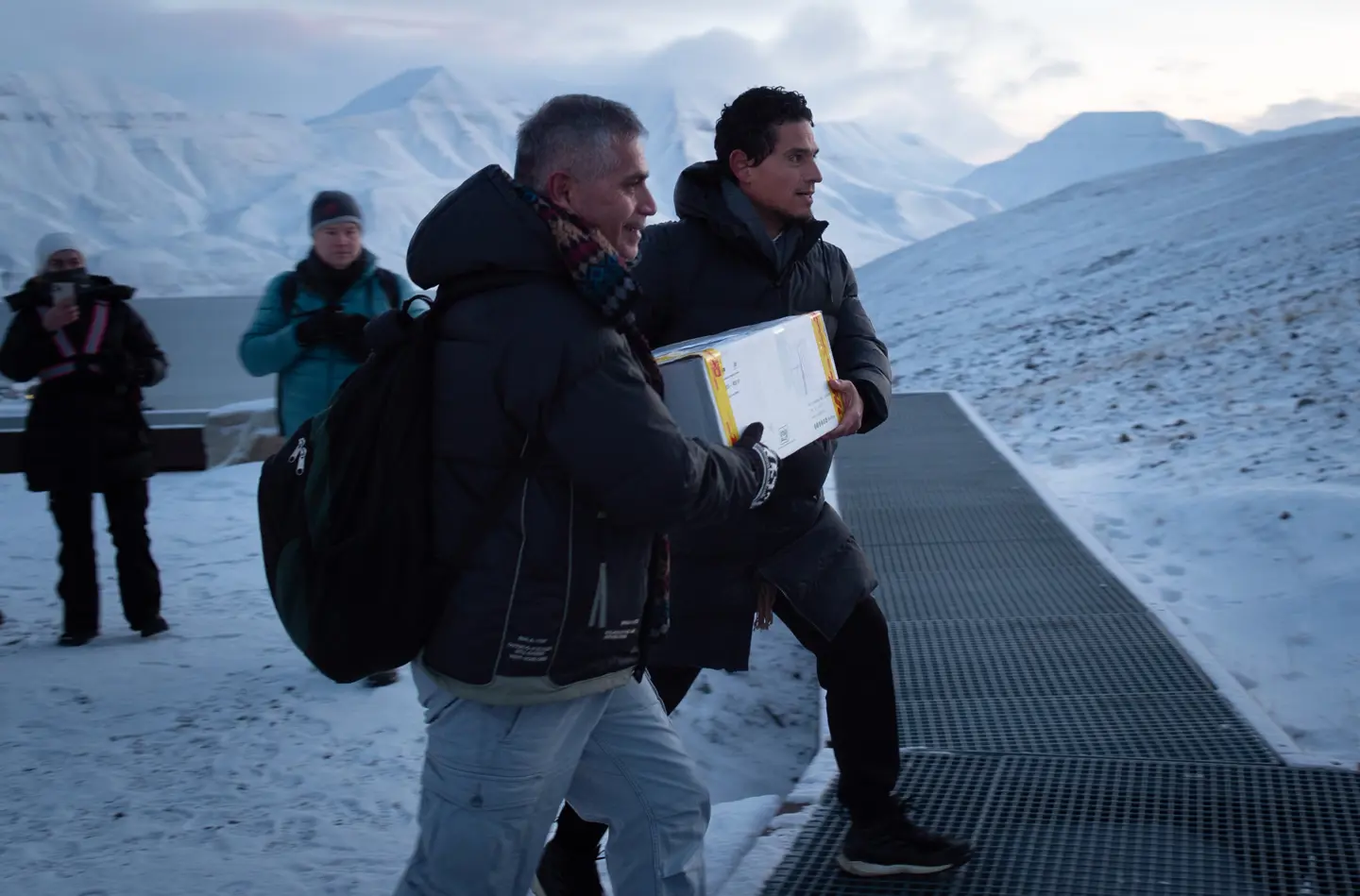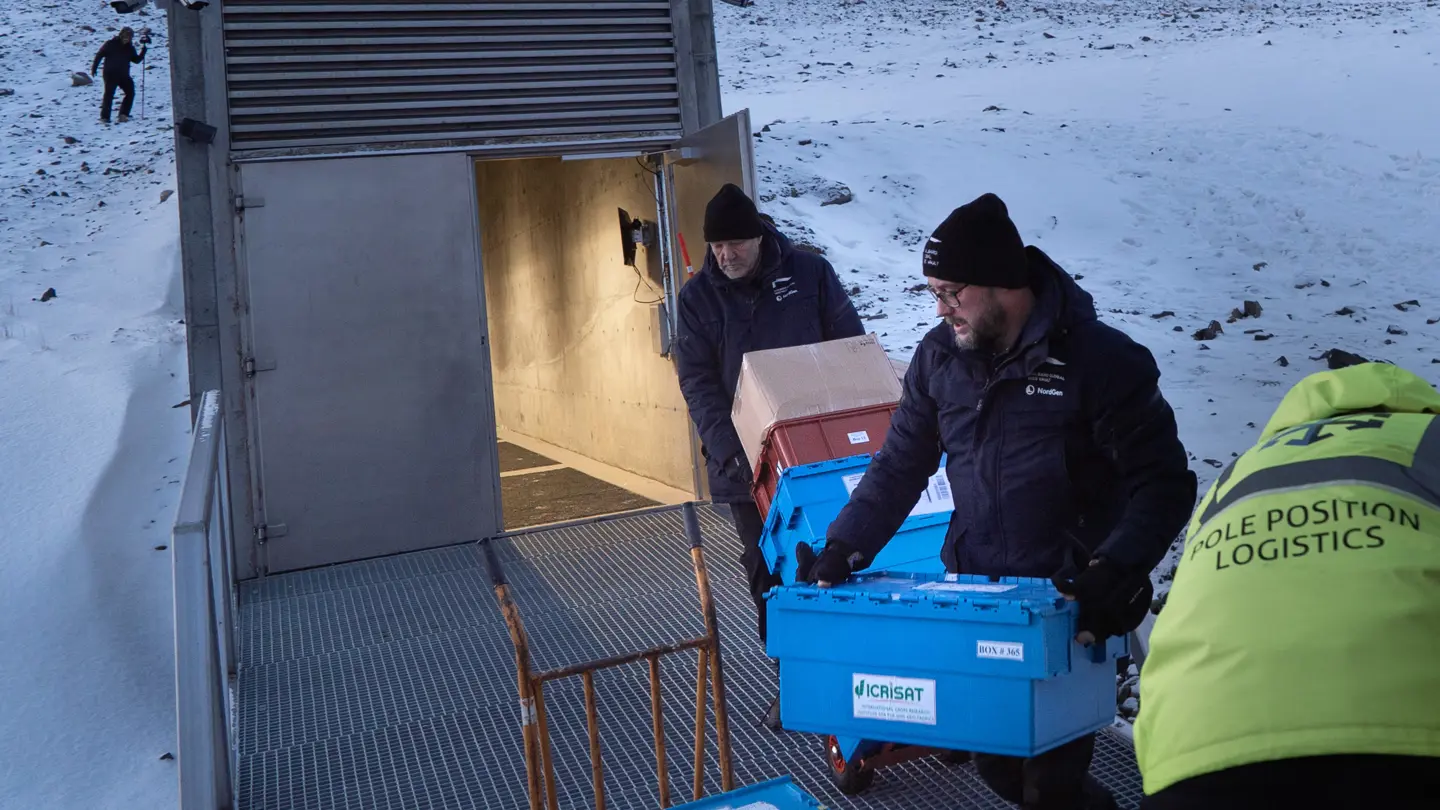
Norwegian prickly lettuce and Peruvian chili peppers safeguarded as genebanks worldwide send seeds to Svalbard
This week marks the third and final seed deposit of the year at the Svalbard Global Seed Vault. In total, more than 21,000 seed samples sent from 20 genebanks will be secured by NordGen staff. Together, the depositors represent all continents except the Arctic and Antarctica.
The 76 boxes now being placed in the Seed Vault’s cold chambers contain, among other things, seed samples of rice from the Philippines, Peruvian chili, traditional African vegetables, and cereals from the Nordic countries. Among the 20 genebanks, two made their first-ever deposits: the Philippine Rice Research Institute (PhilRice) and the Instituto Nacional de Innovación Agraria (INIA, based in Peru). PhilRice was also the institution that sent the most seed samples this time, with over 4,000 different rice varieties shipped to Svalbard.
“Safeguarding seed diversity at Svalbard provides vital protection against natural or man-made disasters, pests, diseases and accidents that could threaten our genebank in the Philippines,” said Jonathan M. Niones, Division Head and Chief Science Research Specialist at PhilRice. This marks the first time in PhilRice’s 40-year history that the genebank has secured seed duplicates outside the country.
Symbol of shared responsibility
The other first-time depositor, INIA, was represented on-site by Director Jorge Juan Ganoza Roncal.
“It is a great honour to take part in this deposit, because here, in this place of global cooperation, we are not only safeguarding seeds, we are safeguarding the very opportunity for life on Earth. By placing them in this vault, we are not merely protecting them from risk; we are entrusting them to the future as a symbol of shared responsibility and our determination to cooperate across borders,” said Jorge Juan Ganoza Roncal.

Jorge Juan Ganoza Roncal, Director of INIA (and closest to the camera) carried the Peruvian box together with Julio Antonio Ubillus Ramirez from the Peruvian Embassy in Norway.
One of the larger shipments this time came from the World Vegetable Center’s Eastern and Southern Africa division, which sent more than 3,000 seed samples originating from around 30 African countries. This selection includes crops such as amaranth, jute mallow, African eggplant, and okra.
NordGen also contributed to the deposit list, having sent one box containing 381 seed samples from 66 plant species. Most of these are various cereals, but the shipment also includes forages, herbs, and crop wild relatives such as wild carrot collected in Denmark and prickly lettuce from Norway.
"This deposit symbolizes a global commitment to protecting the rich diversity of crops that sustains life on Earth. We warmly welcome both returning and new depositors from around the world who have chosen to safeguard their valuable seed sample duplicates in the cold chambers of the Seed Vault. Thank you for your trust,” says Lene Krøl Andersen, Executive Director of NordGen in a statement.

Facts – Participating Genebanks:
- Philippine Rice Research Institute – Philippines
- World Vegetable Center (Tanzania) – Headquarters in Taiwan
- Australian Pastures Genebank – Australia
- International Crops Research Institute for the Semi-Arid Tropics (ICRISAT) – India
- International Livestock Research Institute (ILRI) – Ethiopia
- Plant Breeding and Acclimatization Institute (IHAR) – Poland
- SADC Plant Genetic Resources Centre (SPGRC) – Zambia
- Station Federale de Recherches en Production Vegetale de Changins – Switzerland
- Instituto Nacional Autónomo de Investigaciones Agropecuarias (INIAP) – Ecuador
- Institut National de la Recherche Agronomique (INRA) – Morocco
- Portuguese Bank of Plant Germplasm – Portugal
- Nordic Genetic Resource Center (NordGen) – The Nordic countries
- Taiwan Agricultural Research Institute – Taiwan
- Czech Agrifood Research Center – Czech Republic
- Suceava Genebank “Mihai Cristea” – Romania
- Latvian State Forest Research Institute "Silava" – Latvia
- National Plant Genebank, Ministry of Agriculture – Croatia
- ICRISAT – Malawi division
- Uzbek Research Institute of Plant Industry – Uzbekistan
- Instituto Nacional de Innovación Agraria (INIA) – Peru
Svalbard Global Seed Vault
- Svalbard Global Seed Vault is the world’s largest backup facility for the crop diversity stored in the world’s genebanks.
- It is owned by Norway and operated by three partners; the Norwegian Ministry of Agriculture and Food, Crop Trust and NordGen.
- The Svalbard Global Seed Vault is a black-box long-term safety deposit of crop diversity open to all qualifying institutions around the world.
- Ownership of seeds remains with the depositor and only the depositor can withdraw their seeds and open the boxes.